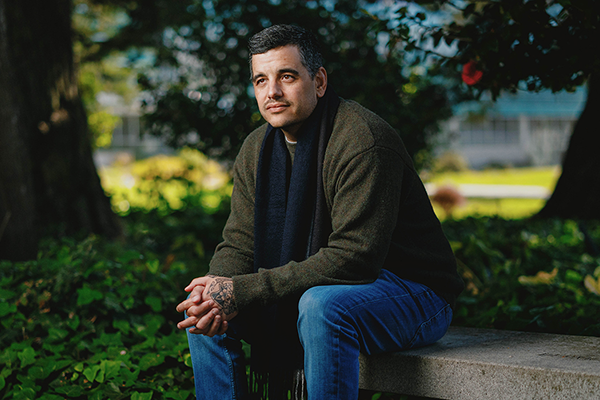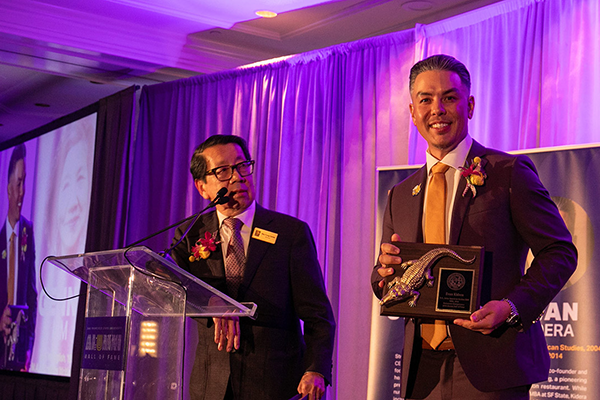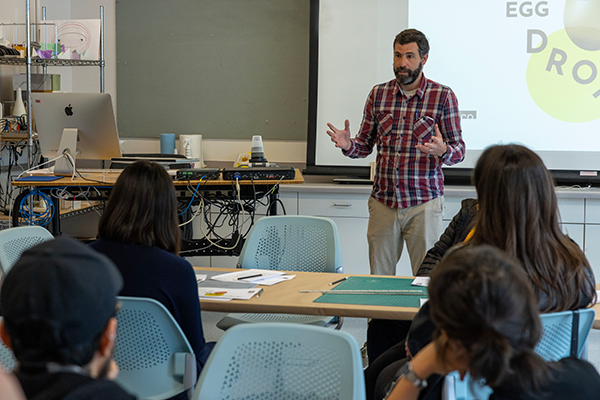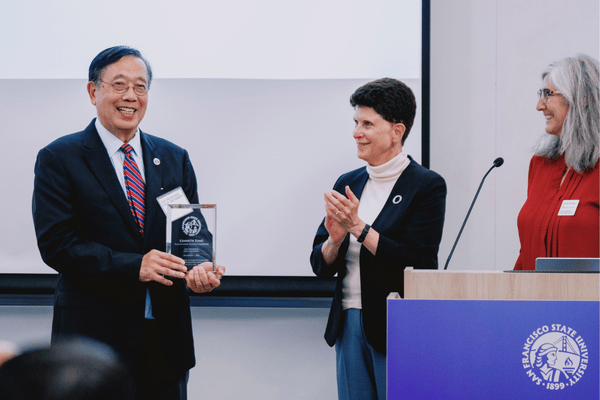News and Announcements

Gabriel “Gabe” Singer is the epitome of higher education’s transformative power. In 2006, he was sentenced to 22 years in prison for voluntary manslaughter that occurred during a fight between street crews. The experience forced him to confront the consequences of his actions and rethink the path his life was taking.
Singer participated in restorative justice opportunities and completed as many community college courses as he could while in prison. When he was released early in 2022, the college credits he earned allowed him to transfer to SFSU, where he’s been working hard toward his life mission: to become a criminal justice studies professor and reform the prison system. Along the way, he also earned the highest recognition of student achievement granted by the CSU.
That award is the CSU Trustees’ Award for Outstanding Achievement, which provides a donor-funded scholarship to students who demonstrate superior academic performance, personal accomplishments, community service and inspirational goals for the future. The awardees have shown a powerful determination to making a positive impact on their generation as well as those who come after them.
“Gabe’s story is of a long comeback,” SFSU President Lynn Mahoney said. “He has emerged from incarceration with a deep commitment to inspiring others to believe in the power of education.”
Singer transferred to SFSU through Associated Students’ Project Rebound, an academic support program that helps formerly incarcerated people enroll and succeed. Since he first started at SFSU, Singer has demonstrated a strong dedication to his education, being an active member of the campus community and advocating for prison reform.
“It’s an honor to receive this award. But it’s also just as importantly an honor to receive this award in representation of an organization called Project Rebound that I am very supportive of,” Singer said. “I think it just shows when someone gets support — in academics or the workforce or in any anything — anyone can thrive and shine in the spaces that they’re trying to be in.”
Singer received his undergraduate degree in Criminal Justice Studies with a minor in Reentry Services from SFSU in spring 2025 and was honored with his department’s Distinguished Student Award. He returns to SFSU this fall to earn a graduate degree in International Relations, which will help him contextualize carceral practices in the U.S. with those beyond our borders.
Singer also taught a course in restorative justice practices through the University’s Experimental College, which he plans to offer again. He also served as a cognitive behavioral therapy coach for Getting Out by Going In, a program that offers participants a framework for making positive, productive decisions in their lives. Singer has also served as a staff member for Project Rebound.
“I first met Gabe when he was an undergraduate student at SFSU. I noticed he was a dedicated student who showed up to campus faithfully with brilliant ideas for civic engagement and the betterment of our legal system,” Project Rebound Executive Director C. Jason Bell said. “I often speak with him about his in-depth analysis of various social justice issues and respected his views so much that I eagerly advocated to embrace him on our Project Rebound efforts on campus, and welcomed him as new staff.”
Learn more about Associated Students’ Project Rebound at SFSU.
Photo by Juan Montes

Over the last 31 years, SFSU has honored more than 150 outstanding Gators at its annual Alumni Hall of Fame celebration. This year, five more remarkable alumni join our ranks: three business leaders in music, beauty and baseball; a pioneering legislator; and a physician dedicated to building healthier communities.
2025 SFSU Hall of Fame inductees:
- Kim Coco Iwamoto (B.A., Creative Writing, ’90)
- Artemis Patrick (MBA, ’01)
- Ghazi Shami (B.A., Radio and Television, ’99)
- Russ Stanley (B.A., Business Administration, ’88)
- Dr. Edgar Velázquez (B.S., Physiology, ’16)
SFSU President Lynn Mahoney and our University community will honor the newest inductees at a celebration and dinner on Friday, Nov. 7, at the InterContinental San Francisco. This year’s inductees represent talented and diverse voices who were nurtured by the SFSU community, Mahoney says.
“Three of this year’s inductees are innovators, transforming the music, beauty and sports-ticketing industries. They applied what they learned at SFSU to their organizations and raised the bar, developing new business models replicated widely by others,” she said. “The other two notable alumni overcame obstacles to pursue their dreams. They’re now dedicating their lives to serving others in politics and in medicine.”

You’ve got a plan for your students’ growth: a syllabus. But how about you? How will you attend to your writing, your research and your scholarship this semester? Join the Health Equity Institute for “Plan Your Work, Work Your Plan” on Thursday, Sept. 11, 1:30 – 3 p.m., in HSS 233.
This workshop aims to set your goals and build a solid and flexible semester plan that makes room for your teaching, research, service and personal growth. Leave the workshop with a plan for the semester and accountability networks to support your goals.
Light refreshments will be served. Please RSVP for “Plan Your Work, Work Your Plan” via Qualtrics.
Photo by Paul Asper

On Sept. 5, President Lynn Mahoney and College of Science & Engineering (CoSE) Dean Carmen Domingo invited the community to the Kenneth S. Fong Translational Research Award Symposium to showcase the impact of this award and honor this year’s recipients. Proposals required collaboration between faculty from at least two different departments with at least one from CoSE.
This year, two projects received awards up to $25,000. Honorees include four SFSU faculty and one postdoctoral fellow, who join over 20 recipients since 2015. Biology Professor Zheng-Hui He, Biology Postdoctoral Fellow Joseph Ramahi and Chemistry and Biochemistry Professor Ray Esquerra are characterizing and enhancing bromoform production in seaweed as a promising strategy to mitigate greenhouse gas emission. Engineering Assistant Professor Alyssa Kubota and Professor of Speech, Language and Hearing Sciences Laura Epstein are improving alternative or augmented modes of communication (AAC) systems so end-users can learn and express socio-emotional concepts via these devices.
Photo by Juan Montes
The SFSU Academic Senate met on Tuesday, Sept. 2, at the Seven Hills Conference Center.
During the meeting, the Senate:
- Presented informational items:
- Institutional Review Committee Final Report
- Non-substantive changes to the Faculty Constitution
- Adopted by general consent: a substantive decrease in units for the minor in European Studies
- Heard in first reading:
- Bachelor of Science in Environmental Studies, concentration in Natural Resource Management: Name change
- Bachelor in Music, concentration in Instrumental Performance: Name change
- Heard presentations from:
- Anoshua Chaudhuri on the Center for Equity and Excellence in Teaching and Learning
- Roberto Santiago on the Disability Programs and Resource Center
The Institute for Civic and Community Engagement invites students to the fall 2025 Service and Internship Fair on Tuesday, Sept. 9, noon – 2 p.m., on the Quad in front of the Cesar Chavez Student Center.
At the fair, students will connect with more than 45 campus and community partners offering:
- Internships and service-learning opportunities
- Community-engaged projects and experiences addressing areas such as social justice, education, health, environment, housing and more
- Hands-on opportunities in fields including arts, advocacy, public service and beyond
The fair is open to all majors and provides pathways for students to build skills, engage with the community and connect their academic learning to real-world impact.
Join Andrea Handy and Marla Williams from Cal Poly Pomona for their three-part “Learning Lab Series” on Wednesdays, Sept. 10, Sept. 17 and Sept. 24. This series is made up of three 30-minute virtual sessions, where you’ll explore practical strategies for navigating uncertainty, embracing adaptability and leading with resilience. Reflect on your own experiences, learn from others and walk away with tools you can use and a digital badge.
The “AI Literacy Essentials: Critical Analysis of Generative AI” course explores the critical analysis of generative artificial intelligence (AI) to support responsible use of this technology. It will take place Wednesday, Sept. 10, 10:30 a.m. – noon, via Zoom.
Learn how AI models are trained and why misinformation and biases may occur in AI-generated content. Develop strategies to analyze AI outputs and assess AI tools for quality and ethical considerations. Participants will be expected to engage in the evaluation process through collaborative, hands-on activities and reflective discussions.
This course is an elective that counts toward receiving a digital badge for the AI Literacy Education Program.
Please visit the SFSU AI website to register for the “Critical Analysis of Generative AI” course.
The CSU Cross Campus Collaboration’s upcoming workshops include:
- Thursday, Sept. 11: “Developmentally Focused Evaluations”
- Friday, Sept. 19: “Bringing your Best Self to Work”
- Friday, Sept. 26: “Success as a First Gen Professional”
- Tuesday, Sept. 30: “Exposing Hidden Bias”
For details and to register, please visit the Human Resources events and training page.
The “Collaboration with Zoom AI Companion” course introduces participants to the Zoom AI Companion and its practical applications within a university setting. It will be held Thursday, Sept. 11, 2 – 3:30 p.m., via Zoom
The course covers key features such as meeting summaries, real-time Q&A, interactive smart recordings and whiteboard tools for generating sticky notes, tables, mind maps and flowcharts. Participants will learn how to apply these tools to enhance productivity, collaboration and learning in academic and administrative contexts through guided demonstrations and hands-on activities.
This course is an elective that counts toward receiving a digital badge for the AI Literacy Education Program.
Please visit the SFSU AI website to register for the “Collaboration with Zoom AI Companion” course.
SFSU has a proud tradition of organizing conferences for Constitution and Citizenship Day, a national holiday that commemorates the signing of the U.S. Constitution in 1787. The conference provides multiple opportunities to reflect critically on the past, present and future of constitutional rights, freedoms, citizenship, democracy, equality, and justice. It will be held 9:30 a.m. – 5:30 p.m. Wednesday, Sept. 17, in Humanities 133 and Thursday, Sept. 18, in Library 121.
For details, please visit the Constitution and Citizenship Day event web page.
The Bay Area chapter of the Scholars Strategy Network is excited to welcome all interested academics to an event co-sponsored with UC Berkeley’s Criminal Law and Justice Center: “Engaging as a Public Scholar in Uncertain Times.”
This day-long event on Friday, Sept. 19, will explore the challenges of public scholarship and feature:
- David Barstow, chair of investigative reporting at UC Berkeley Journalism
- Angélica Salceda, director of the Democracy, Speech and Technology Project at ACLU of Northern California
- Chesa Boudin, executive director of the Criminal Law and Justice Center
The program will also feature two hands-on trainings led by the Scholars Strategy Network: “How to Build and Maintain Relationships with Policymakers” and “How to Write and Pitch Compelling Op-Eds.”
Breakfast and lunch will be served, and participants are invited to socialize at a happy hour following the event. Join for part of the session or the entire program.
Space is limited and early registration is encouraged. Please register for “Engaging as a Public Scholar in Uncertain Times” via the Scholars Strategy Network website.
Join the Center for Equity and Excellence in Teaching and Learning (CEETL) in community for “An Introduction to Mindful Pedagogy” on Friday, Sept. 26, 11 a.m. – 4 p.m. It will be led by Jennifer Daubenmier from the Institute for Holistic Health Studies and Ranjeeta Basu from CSU San Marcos.
This institute offers an opportunity to explore mindfulness practices designed to support faculty and student wellbeing and academic success. Together, the group will cultivate practices that nurture presence, focus and inclusion in our teaching and learning. CEETL will share curriculum modules that can be incorporated into your courses to support students.
Please register for “An Introduction to Mindful Pedagogy” via Qualtrics.
SFSU Spotlight
Students from the departments of Journalism and Broadcast and Electronic Communication Arts (BECA) report stories on KQED-FM from across the Bay Area in the fourth episode of “The Future of the Bay.” Students in Associate Professor Josh Davis’ Journalism/BECA 480 “Audio Journalism” course produce this news magazine radio series.
This one-hour special reports on a jazz-loving church, firefighting goats, a marine lab’s fight for survival and more unexpected stories that amplify diverse voices from all over the Bay. The special first aired on July 4.
SFSU students produced every second of this special report — from reporting to audio production and editing. The student journalists behind this work are: Gabriela Calvillo Alvarez, Cami Dominguez, Kathia Noriega Toloza, August Hammel, Lauren Ormond, Trevor Schock, Sarah Louie, Serrae Bell, Sophia Osborn, Hannah Straily, Sean Young, Isaiah Casillas, Eddie Monares, Mariam Esperanza Coulibaly, Travis Raburn, Olivia Mendez, Natalie Metcalf, Jaiden Forey and Lola Pérez Gómez.
Professor of Marketing Sanjit Sengupta’s short play “Dance With Me” will be presented at The Marsh Theatre in San Francisco on Sept. 15 and Sept. 29 at 7 p.m. as part of the Monday Night Marsh program. The campus community is invited.
John Logan, director and professor of Labor and Employment Studies, wrote an opinion article on Aug. 28 for International Union Rights. It explores the impact of Trump administration policies on the labor movement in the U.S.
Psychology Professor Zena Mello was named a fellow of the American Psychological Association. She is honored to be recognized for her distinguished contribution to the field of Psychology. Her work has changed the way the field understands adolescents with marginalized identities. She has received more than $2 million in federal and state funding to conduct community-engaged research. With her students, she has published more than 80 papers.
Communication Studies Professor Christopher J. Koenig recently published an article with Dr. Sarah Patterson, a clinician-researcher with the University of California, San Francisco, and Osher Center for Integrative Health. The Journal of Rheumatology published the study, titled “Experiences with Complementary and Integrative Health Among People with Rheumatoid Arthritis and Systemic Lupus Erythematosus: A Qualitative Study.”
Rheumatoid arthritis (RA) and systemic lupus erythematosus (SLE) are chronic inflammatory diseases often marked by ongoing pain and fatigue despite advanced medical treatments. Lifestyle medicine (LM) and complementary and integrative health (CIH) approaches are frequently considered as adjuncts, yet little is known about patient experiences with these modalities. Koenig led qualitative data collection and analysis to explore perspectives of English- and Spanish-speaking people with RA and SLE through five focus groups. Transcripts and recordings were analyzed using a combination of qualitative content and thematic analysis to identify patterns of LM and CIH use.
Thirty-nine participants shared 130 accounts of engaging with LM or CIH. Diet was the most frequently discussed LM strategy, with individuals reporting that certain foods either alleviated or exacerbated symptoms. Traditional Chinese medicine and natural products were the most commonly mentioned CIH modalities, and participants expressed interest in trying additional approaches to manage symptoms, including psychedelics to manage symptoms. Barriers centered on uncertainty about safety and effectiveness of LM and CIH, along with the financial burden of out-of-pocket costs. Overall, participants showed strong interest in LM and CIH as adjunctive treatments to biomedical medication, highlighting the need for clear, evidence-based research to guide safe and effective integration of LM and CIH modalities into chronic disease management.